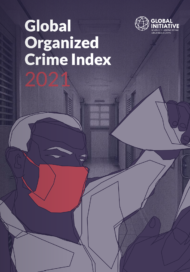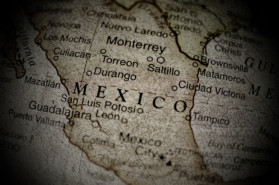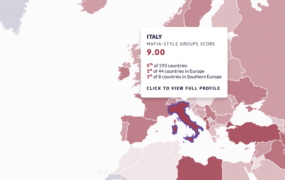The 2021 Global Organized Crime Index findings show that large-scale systemic corruption in Mexico has enabled criminal networks to thrive, and more must be done to address this.
The Global Organized Crime Index results place Mexico among the four most vulnerable countries to organized crime in the world, with a criminality score of 7.57 (the global average is 4.88) and a resilience score of 4.46, below the global average. The cocaine and synthetic drug trade are found to be the main illicit markets, according to the Index, while political leadership and governance are the country’s weakest resilience indicators. According to the Index, resilience is a state’s ability to respond to threats to security, development and justice – the pillars of democracy.
Six years after Mexico established its ‘national anti-corruption system’, a government initiative, the country’s institutions are still far too frail. Constitutional reform and new legal provisions, while positive endeavours, have in themselves failed to dismantle corruption networks that work hand in hand with organized crime groups operating in the country and transnationally.
Corruption cartels
The Index results suggest that criminal operations are facilitated by ‘corruption cartels’, a term used by financial legal specialist Luis Pérez de Acha to refer to networks made up of state and non-state actors who use elaborate operations to launder assets and evade taxes. According to Pérez de Acha, organized crime groups collude with these large-scale corruption networks, primarily through low-level public servants involved in criminal schemes.
These corruption networks use front companies to move large sums of public and private funds, which are then disbursed to finance illegal activities, from illicit enrichment to drugs and human trafficking. To this end, perpetrators use public contracts, real-estate front businesses and tax havens.
Although the authorities have investigated a number of former public servants accused of corruption and of having ties to organized crime, only one has been convicted. The lack of arrests may explain why the Index assigns Mexico such a low score (4.00) for its judicial system and detention indicator: civil society organizations and the media have pointed to lack of independence in judicial institutions as one of the weakest links in the country’s response to organized crime.
One step forward, two steps back
Under the Index, Mexico scores highly for the resilience indicator of national policies and laws, one of the highest for the country at 6.00. A national anti-corruption system, created in 2015 after a reform of the constitution, strengthened the country’s legal framework to prevent and investigate corrupt activities and mete out administrative and criminal sanctions.
The most significant achievements of this drive have been involving citizen representatives in anti-corruption policymaking bodies and expanding the monitoring of public resources. It also established sanctions for administrative offences such as using political influence for enrichment, and collusion and bribery. In addition, an anti-corruption strategy was devised by the financial intelligence unit of President Andrés Manuel López Obrador’s administration. However, although thousands of bank accounts tied to organized crime have been frozen, no one has been arrested and no corruption network has been dismantled.
The Index results underscore how regulatory norms are not enough to tackle corruption in Mexico and dismantle criminal networks whose operations are concealed or enabled by state actors. More needs to be done. Law-making must be met with independent judges and magistrates; an equally independent system; open and impartial criminal investigations; a meritocratic system that ensures the most competent individuals fill public-service roles; a reporting system that protects informers’ identities; and the introduction of penalties proportional to the harm caused by corruption.
These approaches are needed to strengthen the current anti-corruption framework and end impunity, and to establish an impartial and independent judiciary – something that is currently sorely lacking in Mexico.
This analysis is part of the GI-TOC’s series of articles delving into the results of the Global Organized Crime Index 2021. The series explores the Index’s findings and their effects on policymaking, anti-organized crime measures and analyses from a thematic or regional perspective.
Los resultados del Índice global de crimen organizado 2021 muestran que, en México, la corrupción sistémica ha permitido que las redes criminales prosperen. Hay que fortalecer y complementar el marco legal y judicial para abordar el problema de raíz.
Los resultados del Índice global de crimen organizado sitúan a México entre los cuatro países del mundo más vulnerables al crimen organizado, con una puntuación de criminalidad de 7,57 (la media mundial es de 4,88) y una puntuación de resiliencia de 4,46, por debajo de la media mundial. Los comercios de la cocaína y las drogas sintéticas son los principales mercados ilícitos, según el Índice, mientras que el liderazgo político y la gobernanza son los indicadores de resiliencia más débiles del país. Según el Índice, la resiliencia es la capacidad de un Estado para responder a las amenazas a la seguridad, el desarrollo y la justicia: los pilares de la democracia.
A seis años de la creación del Sistema Nacional Anticorrupción, una iniciativa gubernamental, las instituciones mexicanas siguen siendo demasiado frágiles. Una reforma constitucional y nuevas disposiciones legales, si bien son esfuerzos positivos, no han logrado por sí mismos desmantelar las redes de corrupción que trabajan junto a grupos del crimen organizado que operan en el país y a nivel transnacional.
Cárteles de corrupción
Los resultados del Índice sugieren que las operaciones criminales son facilitadas por los «cárteles de la corrupción», un término utilizado por el abogado fiscal mexicano Luis Pérez de Acha para referirse a las redes formadas por actores estatales y no estatales que blanquean activos y evaden impuestos a través de operaciones encubiertas. Según Pérez de Acha, los grupos de crimen organizado conspiran con estas redes de corrupción a gran escala, principalmente a través de funcionarios de menor nivel (municipales o estatales) implicados en tramas delictivas.
Estas redes de corrupción utilizan empresas fachada para mover grandes sumas de fondos públicos y privados, que luego se difuminan y entremezclan en diversos actos ilícitos que van desde el enriquecimiento ilícito hasta el tráfico de drogas y la trata de personas. Para ello, los autores se sirven de contratos públicos, inmobiliarias fachada y paraísos fiscales.
Aunque las autoridades han investigado a varios exfuncionarios acusados de corrupción y vinculación con el crimen organizado, solo uno ha recibido una sentencia condenatoria. El bajo número de condenas puede explicar por qué el Índice asigna a México una puntuación tan baja (4,00) en su indicador de sistema judicial y detención: las organizaciones de la sociedad civil y los medios de comunicación han señalado la falta de independencia de las instituciones judiciales como uno de los eslabones más débiles de la respuesta del país al crimen organizado.
Una de cal y otra de arena
En el Índice, México obtiene una alta puntuación en el indicador de resiliencia de las políticas y leyes nacionales, una de las más altas del país con un 6,00. El Sistema Nacional Anticorrupción, creado en 2015 tras una reforma de la Constitución, reforzó el marco jurídico del país para prevenir e investigar las actividades corruptas e imponer sanciones administrativas y penales.
Los logros más significativos de este impulso han sido la creación de un comité de participación ciudadana que forma parte del máximo órgano de decisión de la política anticorrupción del país, y la ampliación y el fortalecimiento de las facultades de fiscalización de los recursos públicos. También se establecieron, por primera vez, sanciones a particulares por faltas administrativas graves como el tráfico de influencias, colusión, contratación indebida de exservidores públicos y soborno. Además, la Unidad de Inteligencia Financiera de la administración del presidente Andrés Manuel López Obrador diseñó una estrategia anticorrupción. Sin embargo, aunque se han congelado miles de cuentas bancarias vinculadas al crimen organizado en el país, ninguna red de corrupción ha sido desmantelada y no hay un solo detenido.
Los resultados del Índice confirman que el marco legal no es suficiente para controlar la corrupción y desmantelar las redes criminales que operan encubiertas por actores estatales. Hay que hacer más. La elaboración de leyes debe ir acompañada de jueces y magistrados independientes; un sistema de fiscalización autónomo; investigaciones criminales abiertas e imparciales; un sistema meritocrático que garantice que las personas más competentes ocupen puestos en el servicio público; un sistema de denuncias que proteja la identidad de los denunciantes; y una política de sanciones proporcionales a los daños ocasionados por corrupción.
Estas iniciativas son necesarias para fortalecer el marco actual de lucha contra la corrupción y poner fin a la impunidad, así como para establecer un poder judicial imparcial e independiente, algo que actualmente carece gravemente en México.
Este análisis es parte de una serie de artículos de GI-TOC que profundizan en los resultados del Índice global de crimen organizado 2021. Esta serie explora los hallazgos del Índice y sus efectos en el desarrollo de políticas públicas, en las medidas contra el crimen organizado y aporta análisis desde una perspectiva temática o regional.



